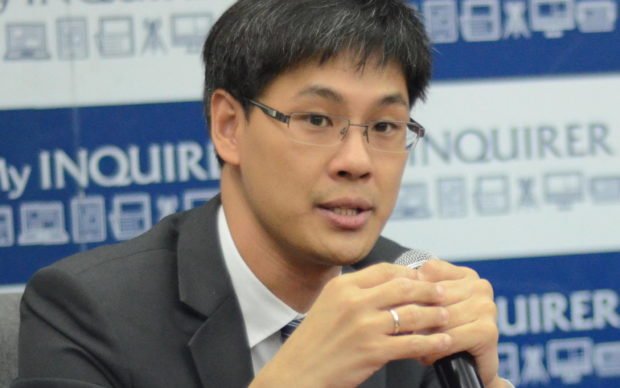Neda chief Chua hopes Marcos admin can remove learning restrictions
MANILA, Philippines — Outgoing Socioeconomic Planning Secretary Karl Kendrick Chua is hopeful that lingering restrictions on face-to-face classes can be dismantled by the incoming administration when students return for the next school year.
“The recovery of the education sector has significantly lagged behind. When I entered government, Ashby was only one year old. Now, he is almost seven years old. He spent his entire Kinder and Grade 1 studying online. He is now in Grade 2 and is only going to school every other week due to an existing one-meter rule inside the classroom that effectively reduced capacity to just 50 percent. This obsolete rule has to go, especially since the entire country is on alert level 1 or 2,” Chua told a press briefing on Monday, referring to his only son Keid Ashby.
“Ashby and other children can go to the malls, play in the streets, and even travel, yet they cannot fully have face-to-face classes. This is very unfortunate. For many Filipinos who do not have power, money, or influence, a good education serves as the stepping stone to realizing their potential and securing a better future. I was one of them,” said Chua, who heads the state planning agency National Economic and Development Authority (Neda).
“With all our children safely back inside their classrooms, our recovery from the pandemic will be stronger and their future more secure,” Chua said. Neda estimates had shown that a school year when students were unable to attend face-to-face classes would inflict P11 trillion in productivity losses across a 40-year period of a person’s working life span.
READ: DepEd prods all schools to resume 100% face-to-face classes for SY 2022-23
Chua said that amid the prolonged pandemic, he already called the attention and personally wrote both also outgoing Education Secretary Leonor Briones as well as Health Secretary Francisco Duque III twice, last March and May, to enjoin them to resume all in-person classes.
“We have had many discussions in the IATF and through messages, so this had been communicated,” the Neda chief said, referring to the Inter-Agency Task Force for the Management of Emerging Infectious Diseases (IATF-EID), which was on top of pandemic response.
“I hope it will be part of the transition message or notes of Secretary Briones to incoming vice president and [Department of Education or DepEd] secretary [Sara] Duterte,” Chua said.
For Chua, “education is a foundation of development, so I hope this will be taken very seriously.”
“The repercussions on children’s present and future development are very much affected by the ability to learn better,” Chua added.
Last week, a joint report of the World Bank, the United Nations Educational, Scientific and Cultural Organization (Unesco), the United Nations Children’s Fund (Unicef), the United Kingdom (UK) government’s Foreign Commonwealth and Development Office, the United States Agency for International Development (USAID), as well as the Bill and Melinda Gates Foundation said learning poverty, or kids aged 10 who can’t read simple texts, was worsening globally, including the Philippines, due to a pandemic-induced decline in the quality of learning.
Estimates for 2019 had shown that learning poverty in the Philippines pre-pandemic already stood at 90.9 percent, while learning deprivation, defined by the report as “the share of children at the end of primary (elementary) who read below the minimum proficiency level,” was also a high of 90.4 percent three years ago.
Schooling deprivation or “the share of primary-aged children who are out of school,” hence “assumed to be below the minimum proficiency level in reading” in the Philippines in 2019 was 5 percent, the report’s estimates based on the country’s performance in the 2019 Southeast Asia Primary Learning Metrics (SEA-PLM) showed.
While the report did not have country-specific estimates for 2022 yet, its simulation results showed that learning poverty in East Asia and Pacific, where the Philippines belonged, likely worsened from 34.5 percent in 2019 to 43 percent under an optimistic scenario, climbed to 44.6 percent under an intermediate scenario, or at worst, jumped to 45.6 percent under the pessimistic scenario.
Across lower-middle-income countries like the Philippines, the learning poverty rate was estimated to rise from 60.4 percent in 2019 to a low of 74.5 percent (optimistic scenario), 76.7 percent (intermediate), or a high of 78.3 percent (pessimistic).
RELATED STORY:
Incoming DepEd chief Sara Duterte eyes full face-to-face classes by August

